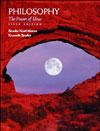 |
1 |  | 
Which view about truth is common to all pragmatists? |
|  | A) | Truth is what all investigators will ultimately agree to. |
|  | B) | Truth is relative to place, time, and purpose. |
|  | C) | Truth is what works for the individual. |
|  | D) | Truth is unchanging. |
 |
 |
2 |  | 
What does philosophical analysis attempt to do? |
|  | A) | Reduce complex, philosophically puzzling propositions into simpler, less puzzling ones. |
|  | B) | Integrate separate, simpler propositions into a more complex, but more complete, whole. |
|  | C) | Show that the concept of objective truth leads to unresolvable paradoxes. |
|  | D) | Replace object-talk with sense-data talk. |
 |
 |
3 |  | 
What determines the meaning of a proposition, according to the logical positivists? |
|  | A) | The intentions of the writer or speaker. |
|  | B) | The public definitions of the words involved. |
|  | C) | The use to which the proposition is put. |
|  | D) | The possible observations that would verify it. |
 |
 |
4 |  | 
According to logical atomism, what does the world ultimately consist of? |
|  | A) | Atomic facts |
|  | B) | Physical atoms |
|  | C) | Immaterial minds |
|  | D) | Sense-data |
 |
 |
5 |  | 
Which best expresses phenomenalism as a metaphyical theory? |
|  | A) | Physical objects don't exist, just sense-data. |
|  | B) | Sense-data don't exist, just physical objects. |
|  | C) | Sense-data are caused by, but not identical with, physical objects. |
|  | D) | Physical objects just are sense-data. |
 |
 |
6 |  | 
According to the epistemological foundationalist, when is a belief knowledge? |
|  | A) | When it is clearly and distinctly true. |
|  | B) | When it logically follows from other beliefs that cannot be doubted. |
|  | C) | When it follows from other beliefs that are true. |
|  | D) | When it meets the current standards of rationality of the group to which the person belongs. |
 |
 |
7 |  | 
Antirepresentationalists like Richard Rorty always deny this claim. |
|  | A) | True beliefs somehow picture or mirror reality. |
|  | B) | True beliefs are those which hang together in a coherent fashion. |
|  | C) | True beliefs are those that most members of our group consent to. |
|  | D) | True beliefs are those that work for the individual. |
 |
 |
8 |  | 
Which view maintains that mental words like "hope", "belief", or "desire" do not refer to things at all, whether physical or nonphysical? |
|  | A) | Dualism |
|  | B) | Behaviorism |
|  | C) | Identity Theory |
|  | D) | Functionalism |
 |
 |
9 |  | 
Which view maintains that mental states just are states of the brain and central nervous system? |
|  | A) | Dualism |
|  | B) | Behaviorism |
|  | C) | Identity Theory |
|  | D) | Functionalism |
 |
 |
10 |  | 
Which view maintains that, although mental states require a physical system to exist, they are not reducible to states of any particular physical system? |
|  | A) | Dualism |
|  | B) | Behaviorism |
|  | C) | Identity Theory |
|  | D) | Functionalism |
 |



 2002 McGraw-Hill Higher Education
2002 McGraw-Hill Higher Education